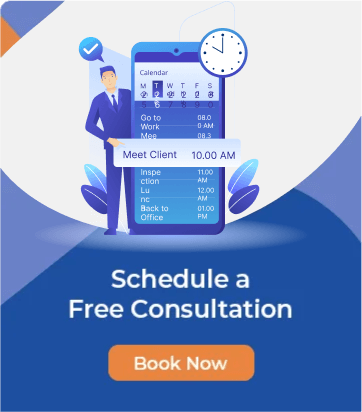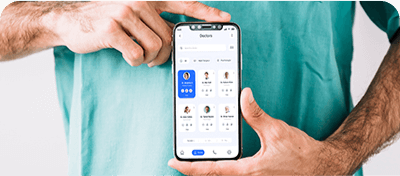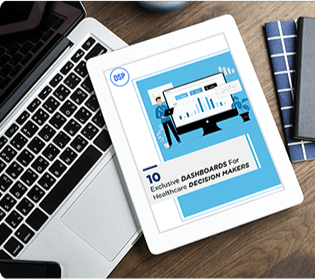Introduction:
Healthcare providers today understand the importance of Medical Informatics in caregiving. Nursing in the healthcare sector holds a massive share, as it has a huge workforce and contributes to the revenue. However, non-clinical/administrative tasks are a concern area for many nurses and nursing centers. It’s a complex zone, requiring clinical and IT knowledge to ensure more productivity and better patient outcomes.
To simplify these administrative chores, nursing informatics was developed. According to American Nurses Associations, nursing informatics integrates nursing and analytical science to detect, define, manage and share data and information across the whole practice. Nursing informatics in healthcare plays a crucial role in improving practice management too.
Further, nursing informatics helps healthcare providers improve healthcare technological applications such as Electronics Health Records or Patient Engagement Systems. It fills the void resulting from communications gaps between nurses and other players across the care continuum. So, nursing informatics is one field in healthcare management, where informatics specialists must have the sound clinical knowledge to translate the data into meaningful information. As per a HIMSS report, nearly 60% of nurses in informatics have ten years of clinical nursing experience. These statistics prove that nursing informatics requires both clinical expertise and tech knowledge. Above all, nurse informatics technology is also about ensuring patient safety.
Challenges in Nursing Informatics
Nursing Informatics and its implementation is not a monumental task. But it has a plethora of challenges that impact its performance and results. Here are some of the major challenges that plague nursing health informatics.
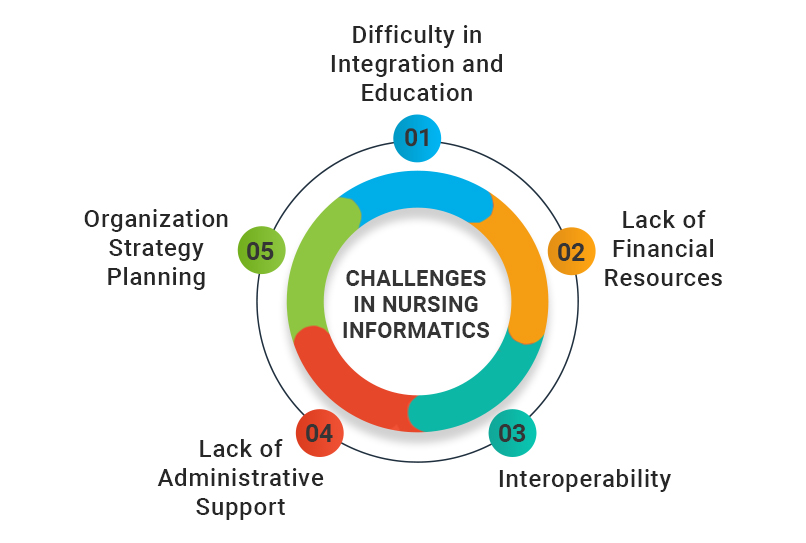
1. Difficulty in Integration and Education
Nursing Informatics or nurse information system is marred by constant issues in integrating informatics with nursing care and other healthcare tasks. This is an ongoing barrier, which impacts internal communications and disrupts the workflow. Moreover, the education and training of the staff is another barrier in nursing informatics. The growing population of aged nurses imposes a big issue in handling nursing informatics solutions. It is because of the lack of technological education in the healthcare system. However, the situation can change with the right resources to train and educate RNs.
2. Lack of financial resources
One of the most common barriers in nursing informatics in healthcare is the lack of adequate financial resources. Rising costs and dripping revenue rip healthcare providers. On top of it, implementing nursing informatics solutions impact the financial status of the providers. However, strategic planning and budgeting are the best way to implement nursing informatics in healthcare. In the long run, this nursing health informatics is beneficial for providers and their ROI.
3. Interoperability
The lack of seamless healthcare interoperability affects a myriad of integrated healthcare solutions. For nursing informatics also, interoperability is a barrier, as the electronic data exchange process is affected. Moreover, nursing informatics encounters several issues like data loss and lack of authentic data without interoperable solutions.
4. Lack of Administrative Support
In nurse informatics technology, the most common challenge is the lack of administrative support. Not every nurse is tech-savvy, so the informatics system requires adequate administrative support for its smooth functioning. Besides, the administrative support helps nurses understand nursing informatics technicalities in healthcare to enhance their care delivery.
5. Organization Strategy planning
Many healthcare providers fail to understand the importance of planning before implementing any technological applications. Similarly, if nursing centers or providers don’t involve in organizational strategy planning in nursing informatics, their practice goals are affected. So, it’s important to strategize all aspects related to nursing informatics to achieve maximum benefits.
Best Features of Nursing Informatics To Maximize Providers’ Benefits
Todays’ healthcare providers know that nursing informatics benefits the overall care system. But if you want to maximize the benefits, you must invest or design a nursing informatics specialty with some essential features. These are the must-have features of the nursing informatics system.
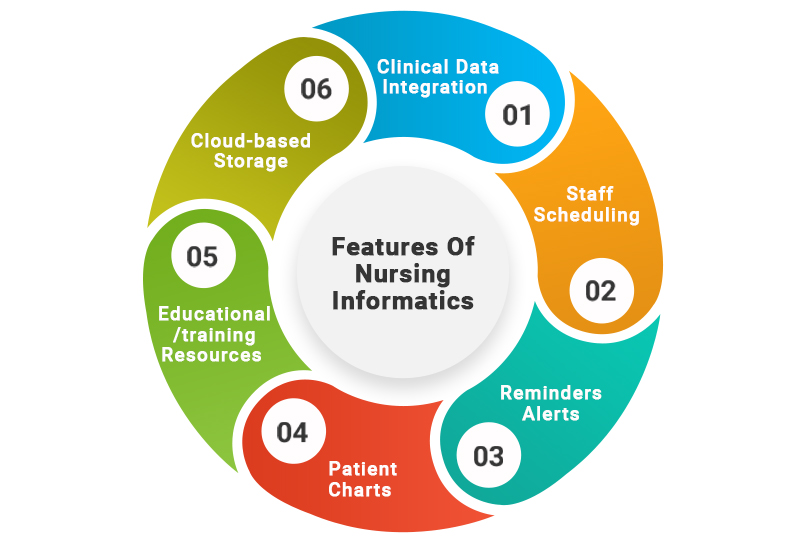
1. Clinical Data Integration
Healthcare analytics solutions are often leveraged to improve data integration. In nursing information solutions, clinical data integration is a significant feature to consider. Providers must ensure proper medical records management so that actionable clinical information is extracted and reviewed. And these clinical data are integrated into the nursing informatics system to improve the patient care plan. So, nursing information systems in healthcare must use this feature to achieve better results.
2. Staff Scheduling
Another important feature to include in the nursing informatics in clinical practice is staff scheduling. Staff scheduling is no easy task, especially in hospitals or large nursing care centers. Incorporating the scheduling feature in nursing informatics systems will increase the productivity of staff. It also ensures timely care delivery and a reduced administrative burden on nurses. With healthcare automation technology, providers can leverage scheduling in nursing informatics too.
3. Reminders/Alerts
You can add a decision support module in nursing informatics to help nurses make timely care decisions. Decision support modules have reminders and alerting systems to prompt RNs to guide, detect and care for the patients. Moreover, in the long run, this feature in nursing informatics will even facilitate population health management.
4. Patient Charts
Providers need to keep structured and organized patient charts. These patient charts generally include medical history, treatment plans, nurses’ assessments, and vital signs. Every patient must have a chart that RNs prepare. However, doing this chart manually isn’t a wise choice. So, integrating this feature in nursing informatics in healthcare is beneficial for both providers and patients.
5. Educational/training resources
Adding a training or educational module in the nursing informatics system is smart. Since several RNs aren’t tech-savvy but have vast clinical nursing knowledge. So, this feature will help them learn and use informatics to maximize the providers’ benefits.
6. Cloud-based storage
Cloud computing in healthcare offers many advantages in healthcare informatics. On that note, if your nursing informatics system is cloud-based, then data storage and extraction are easier. Moreover, the data stored or extracted are more secure and safe in cloud-based storage. So, considering this feature, cloud-based storage in nursing informatics is beneficial for the system. Besides, providers must also ensure HIPAA compliance of the nursing informatics system for patients’ complete safety and security.
How Nursing Informatics Benefits Healthcare Providers
Integrating essential features in nursing informatics solutions will maximize the providers’ benefits on multiple levels. Here are some of the significant benefits.
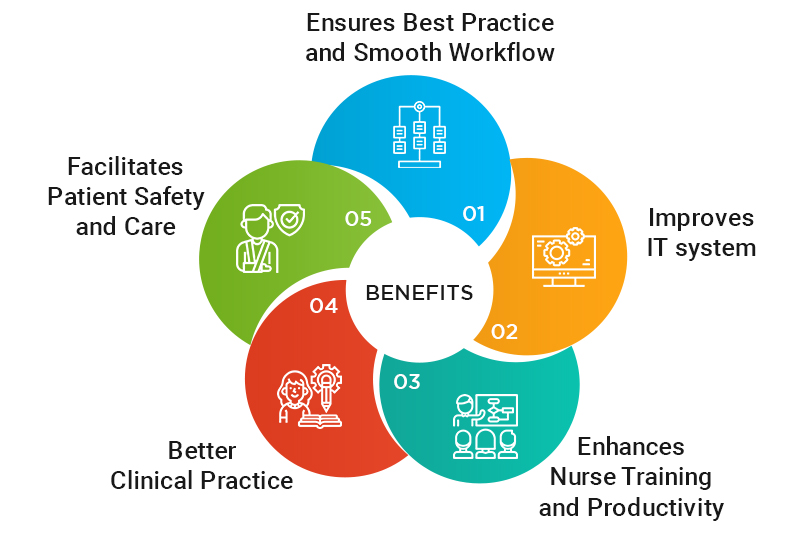
1. Ensures Best Practice and Smooth Workflow
Healthcare providers or EHR vendors investing in nursing informatics highlight how it improves the care practice. Nursing informatics helps nurses by reducing paper-based works and providing real-time actionable data for making critical decisions. With the clinical data extracted from nursing informatics systems, RNs and providers can also decide patient care plans. Moreover, it simplifies the workflow as well. As informatics in nursing helps in scheduling, charting, and decision making, the clinical workflow also improves, enhancing health IT infrastructure.
2. Improves IT system
As highlighted earlier, nursing informatics in healthcare ensure an efficient IT infrastructure. Smooth workflow and clinical data integration improve the whole IT infrastructure of providers.
3. Enhances Nurse training and productivity
Nurses using nursing informatics turn out accurately trained and highly productive. Without any unnecessary administrative burdens, the RNs can focus on care delivery. Moreover, the nurses also develop a strong sense of clinical IT understanding. This has a 3-fold benefit- providers generate more revenue, RNs make better decisions, and shows high productivity.
4. Better Clinical Practice
Nursing informatics helps providers and RNs have a better understanding of their clinical practice. Nursing informatics benefits providers by analyzing their clinical practice to make informed clinical decisions with the accumulated patient data.
5. Facilitates patient safety and care
Of all the benefits, nursing informatics aims to improve patient care and safety. It’s the primary goal of nursing informatics systems. Providers have crucial patient information, which helps them to facilitate better care services.
Conclusion
With a comprehensive understanding of nursing informatics, healthcare providers must also adopt essential features to amplify their benefits. From overcoming the challenges to implementing a personalized nursing informatics system, providers get important insights about patients and their practice through this specialty. These insights benefit the providers and nurses by increasing their productivity, ROI, and care delivery. So, providers must incorporate the nursing mentioned above informatics features to achieve more clinical benefits.
OSP is a trusted healthcare software development company that delivers bespoke solutions as per your business needs. Connect with us to hire the best talents in the industry to build enterprise-grade software.
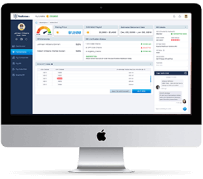
How can we help?
Fill out the short form below or call us at (888) 846-5382
Discuss Your Project Handover with a team of expert Book a free consultation arrow_forward
About Author

Written by Riken Shah linkedin
Riken's work motto is to help healthcare providers use technological advancements to make healthcare easily accessible to all stakeholders, from providers to patients. Under his leadership and guidance, OSP Labs has successfully developed over 600 customized software solutions for 200+ healthcare clients across continents.








